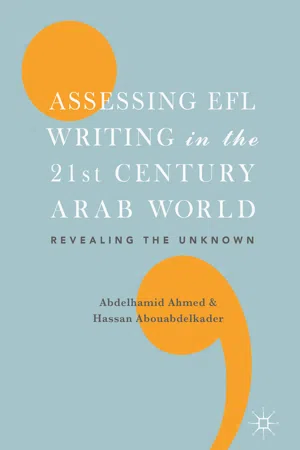Introduction
Research has highlighted the need to assess students’ skills in English as a Foreign Language (EFL) writing in more informative, accurate, and effective ways (Weigle, 2012). Gebril and Hozayin (2011) highlighted that assessment of EFL in general and English writing skills, in particular, are carried out in MENA nations for educational and professional purposes . In educational programmes, assessment of EFL helps make some decisions pertaining to screening, admissions, placement, programme exit, and scholarship selection. However, in professional contexts, it helps assess candidates’ promotion, professional development , hiring, and proficiency in the English language for immigrants (ibid).
Research has shown that assessment training is needed. For example, Taylor (2009) noted that more people are involved in assessment despite not being well trained for this role. Similarly, Gebril and Hozayin (2011) pinpointed that the majority of educators in MENA countries , who are involved in creating and implementing policies of educational assessment, are not well prepared technically. This lack of training indicates an essential need to train educator s in all areas of educational assessment including the diagnostic, placement, formative, summative, and technical aspects of testing such as validity and reliability (ibid).
The current chapter sheds light on some of the challenges and issues pertaining to the assessment of EFL writing in the following ten Arab world university contexts: Algeria , Egypt , Morocco , Oman , Palestine , Saudi Arabia , Sudan , Tunisia , United Arab Emirates , and Yemen . These countries are presented in alphabetical order.
Assessment of EFL Writing in Algeria
The EFL writing proficiency level of most Algerian first-year university students proved to be low intermediate. Researchers who assessed Algerian students’ EFL writing distinguished two proficiency levels: low intermediate, nearly 80% of the new students; high intermediate, around 20% of the new students (Ourghi, 2002). Research findings revealed that low-intermediate students lack mastery of basic syntactic structures, knowledge of writing mechanics, vocabulary and useful composing strategies . In addition, findings of another study indicated that students’ underuse or ineffective use of EFL writing strategies influenced the quality of their writing and low grades on their essays (Hamzaoui-Elachachi, 2006). Other writing deficiencies reported by first-year students include students’ incapability of writing error-free sentences , unawareness of writing basics [i.e. mechanics of writing (e.g. capitalisation, punctuation, indentation], grammar (e.g. subject-verb agreement , use of pronouns) and vocabulary (e.g. frequently using anglicised borrowings from French). Furthermore, students’ pieces of writing are just a list of ideas that lacks cohesion and coherence (Hamzaoui-Elachachi, 2010). Moreover, teaching EFL writing in Algeria has focused more on the product than the process of writing (Chelli, 2013). Consequently, students’ written productions are assessed based on their test scores in EFL writing examinations instead of focusing on students’ development in EFL writing (ibid). As an attempt to develop students’ EFL writing accuracy , grammatical complexity and organisation, Chelli (2013) used self-assessment through portfolios . Findings revealed that students’ writing abilities, attitudes towards writing and meta-cognitive skills have significantly improved.
Other researchers identified some reasons for students’ EFL writing difficulties . These difficulties include students’ negative affect towards writing, with particular reference to students’ high writing apprehension and low writing self-efficacy, and the lack of regular assessment (Moussaoui, 2012) and of adequate responsive educational or pedagogical programmes (Bouhadiba (2000, p. 104). The lack of regular assessment takes place due to large class sizes and using traditional methods of teaching and assessing EFL writing, resulting in students lacking writing autonomy and critical thinking skills (ibid). Having measured the effect of peer evaluation on developing students’ writing autonomy and positive affect, results showed that peer evaluation of students’ writing enhanced their positive attitudes towards peer feedback , decreased their writing apprehension, increased their writing self-efficacy and led to the development of more autonomous student writers (Moussaoui, 2012).
Assessment of EFL Writing in Egypt
Research on assessment revealed that there is a shift in the purpose of assessment in Egypt (Ahmed, 2010; Gebril & Brown, 2014; Hargreaves, 2001). Hargreaves (2001) highlighted in her review of assessment in Egypt that the government aimed to improve assessment in an attempt to improve the educational system and individual learning. However, the use of formal written examinations based on memorisation and rote learning drifted away from any individual learning. In addition, Gebril and Brown (2014) investigated Egyptian teachers’ beliefs about the assessment purposes . Results identified three assessment purposes : improvement, school accountability , and irrelevance. Moreover, another study investigated Egyptian students’ problems with cohesion and coherence in EFL writing at a university in Egypt (Ahmed, 2010). Findings revealed that feedback and assessment practices are rare and traditional.
Other research about EFL writing assessment in Egypt showed that assessme...
